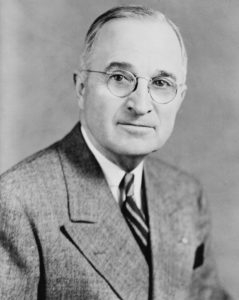Lecture Date: October 6, 2020

When Vice President Harry S. Truman learned of President Franklin D. Roosevelt’s sudden death on April 12, 1945, the realization that he would now be President made him feel, he told reporters, “like the moon, the stars, and all the planets had fallen on me.”
Truman had ample reason to be thunderstruck. And the American people generally shared his trepidation. They knew little about this successor to the legendary FDR, and what they did know was not reassuring.
For one thing, he had been Vice President only during Roosevelt’s fourth term and thus in office for only a few months. His career prior to that was undistinguished, having held sundry jobs with indifferent success before winning election to the US Senate in 1934.
Plain in both appearance and speech, he did not look or sound “presidential.” In short, few people have ever attained the presidency so seemingly ill-equipped for the job. Yet it was his fate to be faced with some of the most crucial problems of 20th century America.
With World War II nearing its conclusion in Europe, the most immediate problem confronting Truman was trying to defeat Japan. His decision to employ the atomic bomb for that purpose was surely one of the most wrenching decisions any President ever had to make – but one that he adamantly defended, declaring with characteristic certitude in his memoirs that he “regarded the bomb as a military weapon and never had any doubt that it should be used.”
Once the war was over, other problems abounded at home as the nation struggled to convert to peacetime status. Rampant inflation, labor unrest, civil rights stirrings—all plagued the new President. And on a personal level, his salty language and general lack of decorum appalled critics who felt that he demeaned the dignity of his high office.
Such was his plight that many observers doubted he would seek re-election in 1948—and when he did, they gave him no chance of defeating Republican Thomas Dewey (who had run relatively well, albeit unsuccessfully, against FDR four years earlier). His chances were diminished further by the emergence of two additional parties: the Progressive Party, whose candidate Henry Wallace’s liberal agenda threatened to syphon off votes of left-leaning Democrats, and Strom Thurmond’s Dixiecrat Party, which attracted Southern conservatives offended by Truman’s civil rights sympathies.
Against such obstacles, Truman’s upset victory remains to this day the foremost political example of a victorious underdog, made more memorable by the iconic Chicago Tribune early-edition headline: “Dewey Defeats Truman.”
The challenges of his second term, both at home and abroad, turned out to be so vexatious that Truman may well have wondered whether his re-election to what he once called “the great white jail on Pennsylvania Avenue” had been worth it after all. To be sure, there were some successes -- for example, his outlawing of racial discrimination in federal employment and his desegregation of the armed forces.
But such developments tended to be overshadowed by the incipient anti-communism crusade of the McCarthy era, as well as by the Korean War, for whose protraction Truman was commonly blamed.
In light of his widespread unpopularity, Truman declined to seek reelection in 1952, leaving office amidst a perception of failure. Yet, unlikely as it seemed at the time, Truman has consistently received high marks from historians, some of whom have adjudged his performance as only one notch below the consensus “greats” such as Washington and Lincoln.
Why such favorable evaluations? Partly, perhaps, because Truman personified “the little man,” a theme often attractive to historians—plus his views on race relations were enlightened for his time. Or maybe the best explanation is simply that, as one historian put it: “His greatness lies largely in having done greatly better than anyone had any reason to anticipate.”
One of the most striking aspects of this development is that Truman himself probably would not have had much concern about it. “Do your duty,” he once said, “and history will do you justice.”
Never one to mince words or to seek an elegant phrase when a simple one would suffice, he commented on one occasion that he wanted only one epitaph for posterity, and it was one he had seen on a tombstone in the Old West: “He did his damnedest.”
Come to think of it, given his tendency to bluntness and his penchant for profanity, those words do seem apt indeed.
Published in the Free Lance-Star October 3, 2020
Speaker: William B. Crawley
UMW Professor Emeritus of History
Director of Great Lives